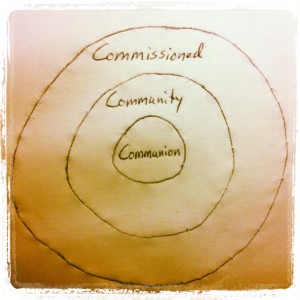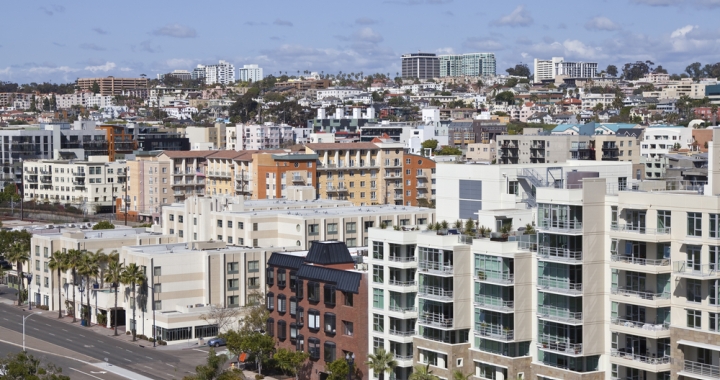A couple months ago I was sitting in the living room of one of the families a part of NieuCommunities here in Golden Hill (San Diego) listening to Rob Yackley describe the three values that shape much of the life and mission we seek to live into each day: Communion, Community and Commissioned. Using the three circles to illustrate the way these values tangibly play out, Rob shared that communion with God informs the life of our community and community fuels our mission of being commissioned as Kingdom players in the everyday realities of our neighbors, city and world.
Seeking also to resource missional leaders outside of our neighborhood, every few months we open up these “key conversations” to leaders across the country. This was one such conversation and as Rob described the community circle, a dynamic leader within the Anglican tradition turned to me and whispered, “He is defining community as a sacrament.” I have been wrestling with the implications of that statement ever since.
Why does it matter?
Sacrament literally means “sign.” In the context of Church history, sacraments are external signs of something sacred. They are signs that point to God through the mediating presence of Jesus. They are those traditions/experiences that continually remind us of the living reality of a God that has not abandoned us, but is radically present.
We often hear, “Let’s take the sacraments together, ” in reference to the bread and wine of Eucharist (or Communion for us modern Evangelicals). The breaking of the bread and the drinking of the wine serve as a sign for what God has done in Jesus and what he will continue to do into the future.
Related: “Don’t Tell Anyone” – Jesus’ warning against always expressing right belief – by Michael Kimpan
There’s the sacrament of baptism, which is a sign of ones’ alignment (some may say Resurrection) into new life in Jesus.
There’s the sacrament of marriage, which is a sign of God’s covenant relationship with the People of God.
But community; how does the sacrament of community play itself out?
 Let’s go back to the circle diagram. At every point on the outer edge of the community circle, the life of the community is exposed to their neighbors. If the Body of Christ (given the name “Church” over the course of Christian tradition) is embodied in our faith communities, then they are to be a sign of what God has in mind for the world. They are to be living reflections of restored and reconciled relationships and the embodiment of Good News in the world. At its best, Christian community is a sacrament (sign) of God’s dream and at its worst, it is a hurdle to a world in need of the hope, restoration and reconciliation found in Jesus.
Let’s go back to the circle diagram. At every point on the outer edge of the community circle, the life of the community is exposed to their neighbors. If the Body of Christ (given the name “Church” over the course of Christian tradition) is embodied in our faith communities, then they are to be a sign of what God has in mind for the world. They are to be living reflections of restored and reconciled relationships and the embodiment of Good News in the world. At its best, Christian community is a sacrament (sign) of God’s dream and at its worst, it is a hurdle to a world in need of the hope, restoration and reconciliation found in Jesus.
What Does That Look Like in Our Neighborhoods?
I recently got a phone call late on a Friday night from a neighbor of ours who is a recovering addict and was forced to move out of the neighborhood for a time. He said, “I need to move back into the neighborhood. It is my family.” He went on to say, “I don’t fully understand it, but the life you guys live as a community had inspired me to follow Jesus again. I can now see that I’ve been isolated and alone and if I’m going to turn back to Jesus then I need people like you in my life.”
I was blown away. It wasn’t one experience or event that our community put together that led him to this place, it was the ongoing presence of love and hospitality in the mundane of everyday life that brought this about. Further, we would argue it was nothing we did that brought about this hope in our neighborhood. Instead, it was our community being a sacrament (sign) to our neighbors of what the living Jesus is up to in the world.
The flip side is that our communities have an equally powerful platform to show characteristics and signs that are anti-Jesus. When we divide, become self-serving, fail to be present in the forgotten places or speak more than we listen, we can become a hindrance to how our neighbors see Jesus through the sacrament of community. As a collective of broken, imperfect human beings, we will never get it right. But we can trust that as we submit to God, to one another and to our neighbors, the sign of the living Jesus will be revealed through Christ’s Body.
Some questions
If my faith community were to cease to exist today, would my neighbors even notice? If so, would they care?
Also by Jon: Why I Went to a Sikh Temple Last Week
Are Christ’s characteristics and heart for the world reflected in the way we live as a community? Do we love selflessly? Do we care for the underserved? Do we steward the land out of reverence for God’s Creation?
Whether we like it or not, our faith communities offer some kind of sign to those who inhabit the contexts around us. What does that sign look like? Is it a sign of God’s redemption and reconciliation or a sign of something quite the opposite?
May it be the former.
—
Jon Huckins is on staff with NieuCommunities, a collective of missional communities who foster leadership and community development. He also co-founded The Global Immersion Project which cultivates difference makers through immersion in global narratives. Jon has a Master’s degree from Fuller Seminary and writes for numerous publications including, theOOZE, Burnside Writer’s Collective & Red Letter Christians. He has written two books: Thin Places: Six Postures for Creating and Practicing Missional Community (Beacon Hill) and Teaching Through the Art of Storytelling (Zondervan). He lives in San Diego with his wife Jan, daughter Ruby. Jon blogs here: http://jonhuckins.net/. You can also follow Jon on Twitter and Facebook.

